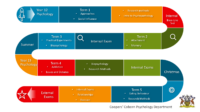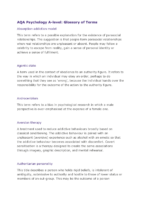Psychology
Psychology is the scientific study of the mind and how it dictates and influences our behaviour, from communication and memory to thought and emotion.
Psychology is about understanding what makes people tick and how this understanding can help us address many of the problems and issues in society today.
As a science psychology functions as both a thriving academic discipline and a vital professional practice, one dedicated to the study of human behaviour – and the thoughts, feelings, and motivations behind it – through observation, measurement, and testing, in order to form conclusions that are based on sound scientific methodology.
Course description: AQA A-level Psychology (7182)
Synopsis of Content: Psychology Year 1
The Psychology A level is an exciting new course for 6th form students. During the first year, students will develop a broad knowledge and understanding of the core areas of Psychology. The topics covered are:
- Social influence – conformity, obedience, resistance to social influence and minority influence.
- Memory – models of memory, forgetting and accuracy of eye-witness testimony.
- Attachment – caregiver-interaction, learning and Bowlby’s theories of attachment and the influence of attachment on relationships.
- Psychological approaches to understanding behaviour – learning, cognitive, biological, humanistic and psychodynamic approaches.
- Psychopathology – defining abnormality, phobias, depression and OCD.
- Research methods – introduction to research methods, experimental design, reliability, validity and ethics.
Synopsis of Content: Psychology Year 2
The second year of the A level course further develops the students understanding of the core areas of Psychology and covers content in greater depth.
Additional content covered in the A Level course are likely to include:
- Biopsychology – nervous system, endocrine system and ways of studying the brain
- Relationships – evolutionary explanations, theories of attraction and virtual/parasocial relationships
- Eating behaviour – evolutionary explanation of food preferences, neuronal and hormonal mechanisms, obesity and anorexia
- Addiction – describing addiction, risk factors, explanations of smoking and gambling, reducing addiction and behavioural change
- Issues and debates in Psychology – bias, free will vs determinism, nature-nurture, reductionism and ethics
- Research methods – significance, scientific method, inferential statistics, and peer review.
What will you learn about?
The emphasis is on applying knowledge and understanding rather than just acquiring knowledge, thereby developing students’ transferable skills of analysis, evaluation and critical thinking. Through a range of topics candidates develop a broad knowledge and understanding of the core areas of psychology.
Good psychology students have developed:
- An enquiring mind: they want to know why people behave in the way they do;
- Critical skills: they can understand the strengths and limitations of theories and research;
- Clarity of expression: they can convey a substantiated argument coherently;
- Data skills: they can interpret statistics to assess the significance of research findings;
- Application skills: they are interested in how to use the knowledge psychology has produced.
Assessment
At the end of year two there are three exams written in June.
Paper 1: Social Influence, Memory, Attachment and Psychopathology (2 hours, 1/3 of A level)
Paper 2: Approaches in Psychology, Biopsychology and Research Methods (2 hours, 1/3 of A level)
Paper 3: Issues and Debates in Psychology, Relationships, Eating Behaviour and Addiction (2 hours, 1/3 of A level)
Careers in Psychology
A number of students have gone on to study Psychology at degree level. The Psychology A Level is a strong academic subject which is excellent preparation for work and further study at degree level, regardless of the course chosen.
Employers want people who can analyse problems and find solutions:
- Psychologists can design complex ways of researching behaviour and processes to enable improvements to be made.
- A Psychology course can help you to “work well with others” by improving your understanding of human behaviour.
- Psychology encourages you to think about why people are behaving as they are, enabling better workplace relationships.
Therefore a psychology degree is able to equip students to enter the job market and pursue any area of interest from finance and banking to HR and media/advertising. A small group of graduates will become psychologists which involves work experience in the relevant clinical areas and then further study to doctorate level.
Homework/extended learning
Regular homework is given and assessed. Successful students usually read outside of the curriculum content, practice exam questions and will write essays on the relevant topics covered over the two years without being prompted. As a department we mark these additional essays/exam questions and offer feedback on how to improve.






